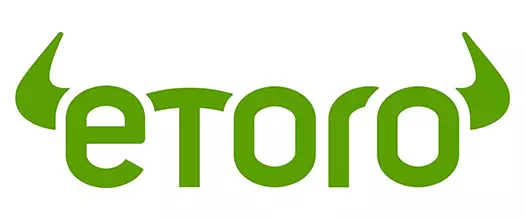- Jump to:
- Top 10 Microsoft Trading Brokers
- How Microsoft Stocks Trading Works for Traders and Brokers
- FAQ
Our team of expert traders tested several regulated and trustworthy stock trading brokers that allow you to speculate on Microsoft’s share price movements. Each broker received a quality score based on several factors, including Trustpilot rating, regulation, fees and commissions, available trading platforms, customer service, and more.
 Plus500 USThis content applies only to Plus500 US and clients from the United States. Trading futures involves the risk of loss.
Plus500 USThis content applies only to Plus500 US and clients from the United States. Trading futures involves the risk of loss. eToro61% of retail investor accounts lose money
eToro61% of retail investor accounts lose money Fusion Markets74-89% of retail's CFD accounts lose money
Fusion Markets74-89% of retail's CFD accounts lose money FP Markets73.85% of retail investor accounts lose money
FP Markets73.85% of retail investor accounts lose money Global Prime74-89% of retail CFD accounts lose money
Global Prime74-89% of retail CFD accounts lose money Pepperstone75.5% of retail investor accounts lose money
Pepperstone75.5% of retail investor accounts lose money
Top 10 Microsoft trading brokers
Since you have ended up here, you are probably planning to improve your financial situation by buying Microsoft stock. To do so, you need to open an account with a brokerage that provides access to the NASDAQ, as this is the main exchange on which MSFT is traded. We have selected precisely such trading brokers by examining their key characteristics and the trading conditions they provide.
 TRADE NOWREAD REVIEWRegulatorsCIRO (Canada), CySEC (Cyprus, # 347/17), FRSA (United Arab Emirates, # 190018), FFAJ (Japan, # 1574), FSCA (South Africa, # 45984), FSRA (Canada, # 190018), ISA (Israel, # 514666577), JFSA (Japan, # 1662), ASIC (Australia, # 406684), BVIFSC (Virgin Islands, British, # SIBA/L/13/1049), CBI (Ireland, # C53877)PlatformsAvaOptions, DupliTrade, AvaSocial, MetaTrader 4, MetaTrader 5, AvaTadeGO, Proprietary Web, ZuluTrade1. AvaTradeMin Deposit$100FeesOvernight interest (daily):
TRADE NOWREAD REVIEWRegulatorsCIRO (Canada), CySEC (Cyprus, # 347/17), FRSA (United Arab Emirates, # 190018), FFAJ (Japan, # 1574), FSCA (South Africa, # 45984), FSRA (Canada, # 190018), ISA (Israel, # 514666577), JFSA (Japan, # 1662), ASIC (Australia, # 406684), BVIFSC (Virgin Islands, British, # SIBA/L/13/1049), CBI (Ireland, # C53877)PlatformsAvaOptions, DupliTrade, AvaSocial, MetaTrader 4, MetaTrader 5, AvaTadeGO, Proprietary Web, ZuluTrade1. AvaTradeMin Deposit$100FeesOvernight interest (daily):- Sell: -0.0144%
- Buy: -0.0189%
Deposit MethodsCommissionsNoneSpreadEUR/USD: AVG 0.8 pips, GBP/USD: AVG 1.2 pips, USDJPY: AVG 1.3 pipsWithdrawal MethodsLeverage EU1:5Leverage non-EU1:400 (Pro Account), 1:30 (Standard Account)InstrumentsBonds CFDs, Commodity CFDs, Crypto CFDs, Crypto Options, Energy CFDs, ETF CFDs, Forex CFDs, Forex Options, Index CFDs, Index Options, Metal CFDs, Share CFDs, Stock CFDs, Stock Options, US Stock OptionsCFDs are complex instruments and come with a high risk of losing money rapidly due to leverage. 71% of retail investor accounts lose money when trading CFDs with this provider. You should consider whether you understand how CFDs work and whether you can afford to take the high risk of losing your money.If you are looking for a trading broker with a particularly rich stock portfolio, there is no need to search further. AvaTrade allows its users to trade MSFT and more than 600 other stocks, with many of them available exclusively through the MetaTrader 5 platform. The brokerage has structured the relevant information in an intuitive and understandable way, so that traders need to make just a couple of clicks or taps to see the numbers for spread, leverage, margin, and overnight fees.
One of the reasons AvaTrade is so popular with traders around the world is that the company is a 100% commission-free stock broker; it charges no commission on any trade. However, if you are not an active trader who performs frequent transactions, you’d better think twice before joining the platform. The brokerage has significant inactivity fees – $50 after three consecutive months of non-use and $100 after one calendar year with no trades performed.
Apart from stocks, AvaTrade extends its operations to indices, commodities, Forex pairs, and treasuries. This multi-licensed Microsoft stock broker keeps receiving awards for the high-quality services it provides. A small sample of the titles AvaTrade has won includes 2022 Best Overall Broker (Day Trading), 2022 No. 1 Innovation (Forex Brokers), and 2021 Best Broker UK (World Economic Magazine).
 TRADE NOWREAD REVIEWRegulatorsCFTC (United States, # 0516820), CySEC (Cyprus, # 120/10), DFSA (United Arab Emirates, # F003484), FSCA (South Africa, # 49976), IFSC (Belize, # 000261/27), FSCM (Mauritius, # GB23202700)PlatformsMetaTrader 4, MetaTrader 4 MultiTerminal, MetaTrader 5, Proprietary Mobile, Proprietary Web2. XM GroupMin Deposit$5FeesAnnual swap rate:
TRADE NOWREAD REVIEWRegulatorsCFTC (United States, # 0516820), CySEC (Cyprus, # 120/10), DFSA (United Arab Emirates, # F003484), FSCA (South Africa, # 49976), IFSC (Belize, # 000261/27), FSCM (Mauritius, # GB23202700)PlatformsMetaTrader 4, MetaTrader 4 MultiTerminal, MetaTrader 5, Proprietary Mobile, Proprietary Web2. XM GroupMin Deposit$5FeesAnnual swap rate:- Long: -3.2%
- Short: -2.8%
Deposit MethodsCommissionsFrom $0SpreadEUR/USD: AVG 1.2 pips, GBP/USD: AVG 1.5 pips, USDJPY: AVG 1.4 pipsWithdrawal MethodsLeverage EU1:30 (CySEC | Retail Account)Leverage non-EU1:1000 (IFSC | Retail Account)InstrumentsBonds CFDs, Commodity CFDs, Crypto CFDs, Energy CFDs, ETF CFDs, Forex CFDs, Forex Options, Index CFDs, Index Options, Metal CFDs, Share CFDs, Stock CFDs, Stock Options, US Stock OptionsCFDs are complex instruments and come with a high risk of losing money rapidly due to leverage. 74.89% of retail investor accounts lose money when trading CFDs with this provider. You should consider whether you understand how CFDs work and whether you can afford to take the high risk of losing your money.XM is an international trading broker highly valued by beginner traders thanks to its excellent customer support, extensive educational content, and negative balance protection feature. Consumers can be confident that the brokerage offers a safe and fair trading environment because it holds licenses issued by reputable regulatory bodies – ASIC, CySEC, and IFSC. The absence of an FCA certificate is slightly puzzling, but it should not be cause for concern.
The base currencies accepted by XM are USD, EUR, GBP, JPY, CHF, AUD, HUF, PLN, RUB, SGD, and ZAR. All of them can be used with Micro and Standard accounts, both of which come with no commission. The most advantageous account type in terms of spreads is XM Zero; however, it can be opened only in USD, EUR, or JPY, and commissions are charged on every trade.
XM ensures that its clients can trade regardless of the device they use. Both MetaTrader 4 and MetaTrader 5 are available in multiple formats, with separate links for PC/Mac, smartphone, and tablet. In addition, the brokerage has developed a mobile trading application that can be downloaded for free from the App Store and Google Play.
 TRADE NOWREAD REVIEWRegulatorsCONSOB (Italy, # 211), FCA (United Kingdom, # 434413), SCB (Bahamas, # 199667 B), CMVM (Portugal, # 433), FSCM (Mauritius, # GB24203277), CVM (Brazil, # 43050.917/0001-03)PlatformsMetaTrader 4, MetaTrader 5, Proprietary Web, TradingView3. ActivTradesMin Deposit$0FeesSwap rates in %:
TRADE NOWREAD REVIEWRegulatorsCONSOB (Italy, # 211), FCA (United Kingdom, # 434413), SCB (Bahamas, # 199667 B), CMVM (Portugal, # 433), FSCM (Mauritius, # GB24203277), CVM (Brazil, # 43050.917/0001-03)PlatformsMetaTrader 4, MetaTrader 5, Proprietary Web, TradingView3. ActivTradesMin Deposit$0FeesSwap rates in %:- Long: -7.299
- Short: 1.299
Deposit MethodsCommissions$0.02 per US share ($1 minimum)SpreadEUR/USD: AVG 0.5 pips, GBP/USD: AVG 0.8 pips, USDJPY: AVG 0.5 pipsWithdrawal MethodsLeverage EU1:5Leverage non-EU1:400 (CMVM | Pro Account), 1:30 (CMVM | Retail Account), 1:1000 (FSC), 1:200 (SCB)InstrumentsBonds CFDs, Commodity CFDs, Crypto CFDs, ETF CFDs, Forex CFDs, Index CFDs, Share CFDsCFDs are complex instruments and come with a high risk of losing money rapidly due to leverage. 73% of retail investor accounts lose money when trading CFDs with this provider.You should consider whether you understand how CFDs work and whether you can afford to take the high risk of losing your money.If you are looking for a reputable brokerage, look no further. ActivTrades is a renowned online broker with more than 20 years of experience in the trading sector. Regulated by tier-1 authorities such as the FCA, CMVM, SCB, CVM, and the FSC (Mauritius), the broker is authorized to serve traders in more than 170 countries.
As an ActivTrades client, you can trade more than 1,000 CFD instruments across seven asset classes. Major company shares are also available as CFDs, including Microsoft’s stock, which is among the tradable symbols at ActivTrades. Although several platform options are offered, share CFDs can be traded only on ActivTrader, the broker’s proprietary platform, and on MetaTrader 5.
Tight spreads are undoubtedly among ActivTrades’ most prominent features. In addition, traders can access market data from stock exchanges without paying subscription fees or other surcharges. Please note that share CFDs carry a small commission per trade, depending on the underlying asset. If you choose to trade CFDs on Microsoft shares, the commission is US$0.02 per share, with a minimum charge of $1. The stock can be traded with a minimum contract size of 0.01 lots, while the maximum order size for the Microsoft share CFD is 700 lots.
 TRADE NOWREAD REVIEWRegulatorsCySEC (Cyprus, # 079/07), FSAS (Seychelles, # SD056), FSCA (South Africa, # 54018), ASIC (Australia, # 246566), BVIFSC (Virgin Islands, British, # SIBA/L/20/1135)PlatformsMetaTrader 4, MetaTrader 5, Proprietary Mobile, Proprietary Web, TradingView4. easyMarketsMin Deposit$25 ($2,000 for MT4 Premium, $10,000 for MT4 VIP)FeesNoneDeposit MethodsCommissionsNoneSpreadEUR/USD: MIN 0.8 pips, EUR/USD: AVG 0.7 pips, GBP/USD: MIN 1.4 pips, GBP/USD: AVG 0.9 pips, USDJPY: MIN 1.5 pips, USDJPY: AVG 2 pipsWithdrawal MethodsLeverage EU1:500 (CySEC | Pro Account), 1:30 (CySEC | Retail Account)Leverage non-EU1:500 (ASIC | Pro Account), 1:30 (ASIC | Retail Account), 1:2000 (FSAS | Retail Account)InstrumentsCommodity CFDs, Crypto CFDs, Forex CFDs, Forex Forwards, Forex Options, Index CFDs, Metal CFDs, Metal Options, Share CFDsCFDs and Options are complex instruments and come with a high risk of losing money rapidly due to leverage. 61% of retail investor accounts lose money when trading CFDs with this provider. You should consider whether you understand how CFDs and Options work and whether you can afford to take the high risk of losing your money.
TRADE NOWREAD REVIEWRegulatorsCySEC (Cyprus, # 079/07), FSAS (Seychelles, # SD056), FSCA (South Africa, # 54018), ASIC (Australia, # 246566), BVIFSC (Virgin Islands, British, # SIBA/L/20/1135)PlatformsMetaTrader 4, MetaTrader 5, Proprietary Mobile, Proprietary Web, TradingView4. easyMarketsMin Deposit$25 ($2,000 for MT4 Premium, $10,000 for MT4 VIP)FeesNoneDeposit MethodsCommissionsNoneSpreadEUR/USD: MIN 0.8 pips, EUR/USD: AVG 0.7 pips, GBP/USD: MIN 1.4 pips, GBP/USD: AVG 0.9 pips, USDJPY: MIN 1.5 pips, USDJPY: AVG 2 pipsWithdrawal MethodsLeverage EU1:500 (CySEC | Pro Account), 1:30 (CySEC | Retail Account)Leverage non-EU1:500 (ASIC | Pro Account), 1:30 (ASIC | Retail Account), 1:2000 (FSAS | Retail Account)InstrumentsCommodity CFDs, Crypto CFDs, Forex CFDs, Forex Forwards, Forex Options, Index CFDs, Metal CFDs, Metal Options, Share CFDsCFDs and Options are complex instruments and come with a high risk of losing money rapidly due to leverage. 61% of retail investor accounts lose money when trading CFDs with this provider. You should consider whether you understand how CFDs and Options work and whether you can afford to take the high risk of losing your money.Thanks to easyMarkets and a handful of other pioneering trading brokers, modern trading has taken the form we know today. As stated on the brand’s website, the company was established in 2001 to give market access to as many users as possible without requiring substantial capital or attendance in physical trading rooms.
A distinctive aspect of easyMarkets’ operation is its innovation-focused approach. Although the brand is one of the oldest in the industry, it keeps adding features to its portfolio, thus remaining attractive even alongside newly established brokers. The latest example is the addition of variable-spread trading via the MT5 platform. Of course, fixed spreads are still available through MT4, as are negative balance protection and a Guaranteed Stop Loss. Another unique tool offered by easyMarkets is Freeze Rate, which allows traders to freeze the price they see for a few seconds, giving them a brief buffer period to execute the trade.
While exploring easyMarkets, we checked the trading hours for U.S. shares, among which is MSFT. Trading Microsoft stock is permitted from 13:35 to 20:00 GMT on weekdays, with no daily break. Customers can access the easyTrade app from Monday 00:00 GMT to Friday 20:55 GMT.
 TRADE NOWREAD REVIEWRegulatorsCySEC (Cyprus, # 109/10), FCA (United Kingdom, # 583263), FRSA (United Arab Emirates, # 220073), FinCEN (United States, # 31000204884179), FINRA (United States, # 298361), FSAS (Seychelles, # SD076), GFSC (Gibraltar, # 1333B), AMF (France, # E2022-038), MFSA (Malta, # C97952), SEC (United States, # 0001753042), ASIC (Australia, # 491139)PlatformseToro App, eToro CopyTrader, eToro Investing5. eToroMin Deposit$50 or $100 based on country ($10 for the UK)FeesNoneDeposit MethodsCommissionsNoneSpreadEUR/USD: AVG 1 pips, GBP/USD: AVG 2 pips, USDJPY: AVG 1 pipsWithdrawal MethodsLeverage EU1:400 (CySEC | Pro Account), 1:30 (CySEC | Retail Account)Leverage non-EU1:400 (FSAS | Retail Account)InstrumentsCommodity CFDs, Crypto CFDs, ETF CFDs, Forex CFDs, Index CFDs, Metal CFDs, Share CFDs, Stock CFDs, US Stock CFDsYour capital is at risk. Other fees apply. For more information, visit etoro.com/trading/fees.
TRADE NOWREAD REVIEWRegulatorsCySEC (Cyprus, # 109/10), FCA (United Kingdom, # 583263), FRSA (United Arab Emirates, # 220073), FinCEN (United States, # 31000204884179), FINRA (United States, # 298361), FSAS (Seychelles, # SD076), GFSC (Gibraltar, # 1333B), AMF (France, # E2022-038), MFSA (Malta, # C97952), SEC (United States, # 0001753042), ASIC (Australia, # 491139)PlatformseToro App, eToro CopyTrader, eToro Investing5. eToroMin Deposit$50 or $100 based on country ($10 for the UK)FeesNoneDeposit MethodsCommissionsNoneSpreadEUR/USD: AVG 1 pips, GBP/USD: AVG 2 pips, USDJPY: AVG 1 pipsWithdrawal MethodsLeverage EU1:400 (CySEC | Pro Account), 1:30 (CySEC | Retail Account)Leverage non-EU1:400 (FSAS | Retail Account)InstrumentsCommodity CFDs, Crypto CFDs, ETF CFDs, Forex CFDs, Index CFDs, Metal CFDs, Share CFDs, Stock CFDs, US Stock CFDsYour capital is at risk. Other fees apply. For more information, visit etoro.com/trading/fees.eToro is a prominent broker that has built a portfolio over the years, including services and offers suitable for both novices and experienced, active traders. Our main reasons for this conclusion are the availability of superior educational content and copy-trading functionality, as well as the option to set up a professional account.
eToro’s overall activity is regulated by some of the most reputable authorities in the field – the Cyprus Securities & Exchange Commission (CySEC), the Financial Conduct Authority (FCA), and the Australian Securities and Investments Commission (ASIC). The brokerage is also authorized to operate in the U.S. market, although with a limited range of services that currently includes only stock trading. Stock spreads fluctuate; for MSFT they usually start at 0.5.
eToro has chosen not to work with third-party trading platforms and instead offers its clients an in-house platform covering more than 3,000 financial instruments. If you are an on-the-go trader, you can download the dedicated mobile apps without sacrificing functionality. The desktop platform and the trading application allow users to easily manage their portfolios and copy the strategies of top-performing traders.
 TRADE NOWREAD REVIEWRegulatorsCySEC (Cyprus, # 371/18), FSAS (Seychelles, # SD130), FSCA (South Africa, # 50926), SCB (Bahamas), ASIC (Australia, # 286354), FSCM (Mauritius, # GB21026264)PlatformscTrader, IRESS, MetaTrader 4, MetaTrader 5, TradingView6. FP MarketsMin Deposit$50 (AU$100)FeesHolding cost:
TRADE NOWREAD REVIEWRegulatorsCySEC (Cyprus, # 371/18), FSAS (Seychelles, # SD130), FSCA (South Africa, # 50926), SCB (Bahamas), ASIC (Australia, # 286354), FSCM (Mauritius, # GB21026264)PlatformscTrader, IRESS, MetaTrader 4, MetaTrader 5, TradingView6. FP MarketsMin Deposit$50 (AU$100)FeesHolding cost:- Long: -5%
- Short: -2.5%
Deposit MethodsCommissions$0.02/share for NYSE/NASDAQ, min $15SpreadEUR/USD: AVG 1.2 pips, GBP/USD: AVG 1.4 pips, USDJPY: AVG 1.5 pipsWithdrawal MethodsLeverage EU1:500 (CySEC | Pro Account), 1:30 (CySEC | Retail Account)Leverage non-EU1:30 (ASIC | Retail Account), 1:500 (FSAS | Retail Account)InstrumentsCommodity CFDs, Crypto CFDs, Energy CFDs, Forex CFDs, Index CFDs, Metal CFDs, Stock CFDsTrade Responsibly: Derivative products are highly leveraged, carry a high level of risk and are not suitable for all investors.If you are looking for a multi-asset trading broker with excellent customer support and strict regulatory oversight, FP Markets is the right choice. The brokerage offers CFD trading on more than 10,000 shares, indices, metals, bonds, and other assets.
Regarding customer support, the team is reachable via email, phone, and live chat, the last of which delivers extremely fast response times. A member of our team verified this by initiating a chat session with a question about MSFT leverage for traders outside the EU. The answer arrived in less than a minute, stating that the upper limit is 1:20. However, FP Markets allows users to adjust their leverage settings in a dedicated section of their accounts.
In addition to FP Markets’ range of trading markets and platforms, there is also significant diversity in the available account types. If you prefer using MetaTrader 4 or MetaTrader 5, you can choose between two account types: Standard and Raw. Your choice depends on whether your priority is zero commission or minimum spreads. Traders who prefer operating with the Iress platform can set up a Standard, Platinum, or Premier account. Minimum deposits range from AU$1,000 to AU$50,000, and each account carries a commission on every trade.
 TRADE NOWREAD REVIEWRegulatorsCySEC (Cyprus, # 092/08), FSCA (South Africa, # 46860)PlatformsMetaTrader 4, MetaTrader 5, Proprietary Web, TradingView7. Markets.comMin Deposit$100Fees
TRADE NOWREAD REVIEWRegulatorsCySEC (Cyprus, # 092/08), FSCA (South Africa, # 46860)PlatformsMetaTrader 4, MetaTrader 5, Proprietary Web, TradingView7. Markets.comMin Deposit$100Fees- Overnight interest:
- Buy: -0.0354%
- Sell: -0.0257%
Deposit MethodsCommissionsNoneSpreadEUR/USD: AVG 0.9 pips, GBP/USD: AVG 1.1 pips, USDJPY: AVG 0.9 pipsWithdrawal MethodsLeverage EU1:294 (CySEC | Pro Account), 1:30 (CySEC | Retail Account)Leverage non-EU1:300 (FSCA)InstrumentsBonds CFDs, Commodity CFDs, Crypto CFDs, ETF CFDs, Forex CFDs, Index CFDs, Metal CFDs, Share CFDsCFDs are complex instruments and come with a high risk of losing money rapidly due to leverage. 68% of retail investor accounts lose money when trading CFDs with this provider. You should consider whether you understand how CFDs work and whether you can afford to take the high risk of losing your money.Markets.com is a well-regulated broker that provides a commission-free pricing environment for CFD trading in shares, currencies, indices, cryptocurrencies, and other instruments. The company aims to be among today’s leading global trading brands, as evidenced by the three different licenses it holds from CySEC, the FSCA, and the FSC (British Virgin Islands). However, at least for now, traders residing in Japan, Canada, Belgium, and the United States are not eligible to open accounts with Markets.com.
Trading Microsoft stock with this broker is cost-effective, as the firm charges no commission on any CFD trade, and comparisons with other brokers show that the spreads offered by Markets.com are highly competitive. One of the few fees charged by the broker is overnight interest. Its current value for MSFT is shown in the table below, along with the standard industry leverage of 1:5.
Not only is the main Markets.com website available in several languages (English, Spanish, French, Vietnamese, etc.), but customer support is as well. You can contact the broker on weekdays by phone, live chat, or an online query form. The company has also compiled an extensive FAQ section that answers most common questions.
- 8. AdmiralsMin Deposit$25FeesSwap values (%):
- Long: -0.01689
- Short: -0.01644
Commissions- From $1 on Invest
- MT5 accounts only
SpreadFrom 0.01Leverage EU1:5Leverage non-EU1:5CFDs are complex instruments and come with a high risk of losing money rapidly due to leverage. 81% of retail investor accounts lose money when trading CFDs with this provider. You should consider whether you understand how CFDs work and whether you can afford to take the high risk of losing your money.Judging from the Education section of Admirals’ main website and the overall range of services provided by the broker, we can safely say that it can benefit traders at any level, from complete beginners to practitioners with years of experience. For novices, multiple webinars, articles, tutorials, and special courses such as Zero to Hero are provided. Skilled traders also have plenty of reasons to like Admirals, as the broker offers competitive trading conditions and advanced software solutions.
Regarding stocks, users can choose from 3,204 brands that can be filtered by exchange and country or by industry group. Other markets available at Admirals include forex, commodities, indices, ETFs, bonds, and cryptocurrencies.
The account types supported by Admirals are tied to either the MetaTrader 4 or MetaTrader 5 platforms. Generally speaking, the available account types are Trade.MT5, Invest.MT5, Zero.MT5, Trade.MT4, and Zero.MT4. However, when it comes to trading Microsoft stock, the options are somewhat more limited: Trade.MT4, Trade.MT5, and Invest.MT5. Minimum deposit amounts and commission rates may vary from country to country, so be sure to check the respective T&Cs carefully before you execute any orders.
 TRADE NOWREAD REVIEWPlatformscTrader, MetaTrader 4, MetaTrader 5, TradingView, Blueberry X, WebTraderMin Deposit$100FeesNo fees on FX or CFD productsDeposit MethodsCommissions$2SpreadEUR/USD: AVG 1.1 pips, GBP/USD: AVG 1 pips, USDJPY: AVG 1.5 pipsWithdrawal MethodsLeverage EU1:5Leverage non-EU1:30 (ASIC | Retail Account), 1:500 (FSCM), 1:500 (VFSC)InstrumentsCommodity CFDs, Crypto CFDs, Forex CFDs, Index CFDs, Share CFDsMargin trading involves a high level of risk and is not suitable for all investors. You should carefully consider your objectives, financial situation, needs and level of experience before entering into any margined transactions with Blueberry Markets, and seek independent advice if necessary. Forex and CFDs are highly leveraged products, which means both gains and losses are magnified. You should only trade in these products if you fully understand the risks involved and can afford to incur losses that will not adversely affect your lifestyle.
TRADE NOWREAD REVIEWPlatformscTrader, MetaTrader 4, MetaTrader 5, TradingView, Blueberry X, WebTraderMin Deposit$100FeesNo fees on FX or CFD productsDeposit MethodsCommissions$2SpreadEUR/USD: AVG 1.1 pips, GBP/USD: AVG 1 pips, USDJPY: AVG 1.5 pipsWithdrawal MethodsLeverage EU1:5Leverage non-EU1:30 (ASIC | Retail Account), 1:500 (FSCM), 1:500 (VFSC)InstrumentsCommodity CFDs, Crypto CFDs, Forex CFDs, Index CFDs, Share CFDsMargin trading involves a high level of risk and is not suitable for all investors. You should carefully consider your objectives, financial situation, needs and level of experience before entering into any margined transactions with Blueberry Markets, and seek independent advice if necessary. Forex and CFDs are highly leveraged products, which means both gains and losses are magnified. You should only trade in these products if you fully understand the risks involved and can afford to incur losses that will not adversely affect your lifestyle.Blueberry Markets is a regulated Australian trading broker, highly regarded for its superb customer support, fast execution speeds, and seamless transactions. Although the company was only established in 2016, it already has more than 30,000 registered traders; with such a client-focused approach, this number is likely to grow even further.
Now, let’s take a closer look at what you can expect from Blueberry Markets. Regardless of the trading platform you decide to work with (MT4, MT5, or Web Trader), you are entitled to open either a Blueberry Standard Account or a Blueberry Direct Account. Both options require a minimum deposit of $100 and offer identical conditions for minimum trade size (0.01), tradable instruments (over 300), and leverage (up to 1:5 on stocks). The distinctive feature of Standard accounts is that they allow for commission-free trading, as all costs are incorporated into the spread. Direct accounts, on the other hand, come with tighter spreads but also with a commission on every executed trade.
A testament to the fact that Blueberry Markets cares about its clients’ welfare is its Refer-a-Friend promotion. Existing users will receive a $100 cash bonus if a friend joins the platform and makes a minimum deposit of $1,000, or the equivalent in another accepted currency. The referred client must also trade at least one standard lot within 60 days of opening their account. Important note: Although the broker frequently renews this promotional offer, it is temporary, so always check the T&Cs in advance.
- 10. IC MarketsMin Deposit$200FeesNoneDeposit MethodsCommissions$0.02/share for NYSE/NASDAQSpreadEUR/USD: AVG 0.82 pips, GBP/USD: AVG 1.03 pips, USDJPY: AVG 0.94 pipsWithdrawal MethodsLeverage EU1:500 (CySEC | Pro Account), 1:30 (CySEC | Retail Account)Leverage non-EU1:1000 (FSAS | Retail Account)InstrumentsCommodity CFDs, Crypto CFDs, Energy CFDs, Forex CFDs, Index CFDs, Metal CFDs, Stock CFDsTrading Derivatives carries a high level of risk to your capital and you should only trade with money you can afford to lose. Trading Derivatives may not be suitable for all investors, so please ensure that you fully understand the risks involved and seek independent advice if necessary.
IC Markets is a trustworthy MSFT stockbroker headquartered in Sydney, Australia. The selection of trading platforms available through this brokerage suggests that it can meet the needs of both experienced active traders and newcomers to the field. In terms of desktop platforms, IC Markets relies on three third-party options – MT4, MT5, and cTrader. They provide a wide variety of features, resulting in an abundance of tools and analysis methods for stock trading. Dedicated apps are also available, allowing you to trade any supported financial instrument regardless of device or location.
This broker offers more than 1,800 U.S. and Australian stocks in its portfolio. Keep in mind that if you plan to trade MSFT, you must use MetaTrader 5, as stocks are available only on this platform. We strongly advise you to contact customer support and request more information on how to take advantage of any applicable reduced rates. This is because dividend adjustments are charged to non-U.S. residents holding U.S. CFDs.
The educational hub of IC Markets is one of the most comprehensive that we have come across while reviewing the world’s top trading brokers. Content is provided in every possible form – basic concept tutorials, news sections, webinars, podcasts, a specialized blog, as well as fundamental and technical analyses.
When it comes to tech giants, the first name that pops into most users’ minds is Microsoft. Founded in 1975 by Bill Gates and Paul Allen, the company has become a world leader, producing and selling a vast range of products, from personal computers to cloud computing systems for space equipment. Microsoft’s main competitors are Apple Inc. and Amazon.com Inc., for which separate articles are provided on Tradingpedia’s website.
Quite logically, the growth mentioned above has generated significant earnings. Despite the turbulence in recent years caused by the Covid pandemic and military conflicts around the world, Microsoft shares have maintained healthy levels and financial analysts’ predictions remain optimistic.
How Microsoft stock trading works for traders and brokers
Operating on such a large scale inevitably requires a colossal amount of capital, and one way to raise it is through selling shares to the public. Given the high level of interest in the brand, Microsoft shares are included in the portfolios of most of today’s trading brokers. If you are a trader who is about to start dealing with MSFT, it is a good idea to familiarise yourself with the ins and outs of the process and then select a reliable brokerage platform.
In brief, MSFT trading involves buying and selling shares in the company and making a profit from the daily price changes. Unlike investors who pursue long-term strategies, traders closely monitor short-term price fluctuations and attempt to sell high or buy as low as possible. Microsoft stock brokers have adopted similar, though not identical, pricing policies, which comprise spreads, commissions, and trading and non-trading fees. Brokers use both proprietary and third-party platforms, as well as offering different account types, so it will be to your advantage to research each broker beforehand.
We bring to your attention five basic steps around which to build a successful MSFT trading experience:
- Open a brokerage account. If you are unsure which trading broker matches your level of expertise and trading style, take a look at the reviews of the top Microsoft stock brokers below.
- Determine a trading budget and never deviate from it. Invest only money that you do not need to cover daily expenses.
- Learn how to use different order types, mainly market and limit orders.
- Practise with a demo account. This recommendation applies even if you are an experienced trader but will be using this broker for the first time.
- Measure your results to identify your strengths and weaknesses, and thus be able to adjust your strategy if necessary.













